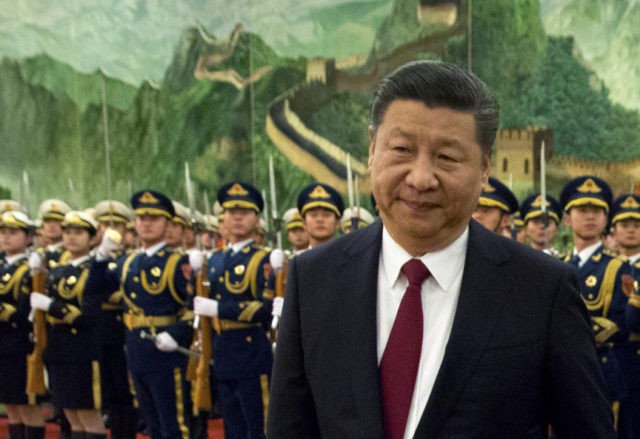The Shekou Museum of China’s Reform and Opening-Up in Shenzhen, China, just emerged from a few months of renovations with an “upgraded” layout that replaces tributes to visionary President Deng Xiaoping with glowing tributes to China’s current and increasingly dictatorial leader, Xi Jinping.
Observers wonder if Xi’s cult of personality might have gone a little too far, given that Deng is widely revered as the architect of China’s economic success.
The Wall Street Journal on Monday pointed out the unmistakable symbolism of relegating Deng Xiaoping to the status of Xi Jinping’s warmup act on the 40th anniversary of Deng’s policy reforms:
“This is mythmaking in action,” said Julian Gewirtz, a historian at Harvard University who has studied Chinese economic reforms. In shaping narratives about China’s future, Mr. Xi is “claiming greater authorship over China’s past.”
Since taking power in late 2012, Mr. Xi has sought to adapt Chinese history for his agenda, rewriting official accounts while flexing legal and media muscles to enforce his narratives. Officials have updated textbooks and museums to imprint the president’s policies. A new law prescribes criminal and civil penalties for defaming party-approved “heroes and martyrs.”
The goal, historians say, is to bolster Mr. Xi’s authority by cementing his own story for China: the Communist Party – led by a strong and astute leader – shepherding the Chinese people toward restored national glory.
This has unsettled some Chinese, who worry their leader is reviving Mao-style dictatorship. Last month, a professor at the prestigious Tsinghua University stirred debate with a widely read essay condemning Mr. Xi for what he called the president’s authoritarian turn and efforts to generate a personality cult.
That sense of anxiety is especially keen for those who view Deng as the man who ended Mao’s bloody dictatorial insanity and put China on the path to economic stability. Xi used to be one of those people, presenting himself early in his political career as a humble acolyte of Deng’s wisdom, but now Xi’s government seems incapable of staging an event that doesn’t trivialize Deng in favor of the new Great Man, using techniques both grandiose and petty:
At the national art museum in Beijing, paintings of Mr. Xi and his late father—who helped steer reforms as a provincial chief—were displayed prominently at a reform-anniversary exhibition, overshadowing artwork depicting Deng and other past leaders. In 2008, Deng artwork dominated a 30th-anniversary exhibition at the same museum, according to photos on its website.
A state publisher released a 371-page book titled “Research Into Xi Jinping Thought on Reform and Opening-Up.” State media credited Mr. Xi’s stints as a regional leader for development successes in Fujian and Zhejiang provinces. Those commentaries often omitted Deng, even though Mr. Xi—as a provincial official—had cited the late leader’s policies as a guide for his own.
The Shenzen museum once celebrated Deng for transforming it from a fishing village into a teeming cultural metropolis, but now the first thing visitors see is a quote from a speech Xi Jinping gave just a few months ago, and the last thing they see on their way out is an exhibit praising Xi’s “Belt and Road” international infrastructure program.
Visitors to the National Museum of Art in Beijing were somewhat surprised to see very little sign of Deng Xiaoping in the exhibit dedicated to the 40th anniversary of Deng’s reforms. Deng did manage to slip into the second-largest painting in the exhibit, where he was depicted as a student listening raptly to a lecture by Xi Jinping’s father.
This historical revisionism is not merely intended to flatter Xi’s vanity. The Diplomat noted on the occasion of Xi’s three-hour stemwinder to the Communist Party Congress in October 2017 that “Xi Jinping Thought” has profound differences with “Deng Xiaoping Theory,” beginning with a reduced emphasis on coastal cities like Shenzen and a greater focus on inland industrial centers.
More importantly, Deng wanted China to act patiently and keep a low profile internationally, while Xi is an aggressive expansionist who thinks China should take center stage as an Asian regional hegemon and global superpower. A great deal of what Deng said in his day could now be interpreted as a direct rebuke of Xi, especially his concerns about Mao-style imperial leaders ruling for life.
Xi also wishes to be seen as uniquely concerned about corruption, when in fact most of his anti-corruption measures are merely echoes of Deng’s policies. Xi wants Deng out of the picture so he can write himself into China’s history books as a reformer without precedent. Luckily for Xi and unluckily for Deng, history is written and re-written by the living.

COMMENTS
Please let us know if you're having issues with commenting.